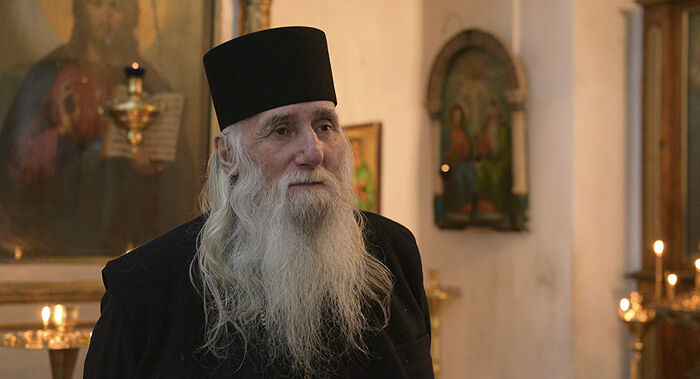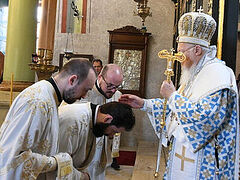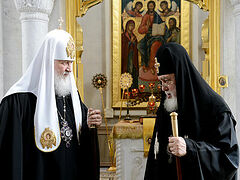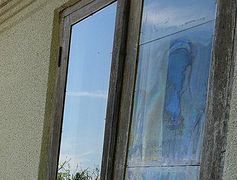Sukhumi, Abkhazia, February 22, 2021
 Fr. Vissarion Apliaa, the head of the self-declared "Abkhazian Orthodox Church." Photo: sputnik-abkhazia.ru
Fr. Vissarion Apliaa, the head of the self-declared "Abkhazian Orthodox Church." Photo: sputnik-abkhazia.ru
Services in all churches of the so-called “Abkhazian Orthodox Church” have been suspended in an effort to force His Holiness Patriarch Kirill of Moscow to resolve their status.
The move was made by the head of self-declared autonomous church, Fr. Vissarion Apliaa, who was voted as the interim administrator of the Diocese of Sukhumi and Abkhazia of the Georgian Orthodox Church after the Georgian-Abkhazian war of 1992-1993 that resulted in most Georgian clergy being expelled for political reasons.
Services continue only in the main cathedral in Sukhumi, where Fr. Vissarion himself serves. “I served there both before the war and after the war, so the cathedral has canonical rights,” he said, reports RIA-Novosti.
Having served as interim diocesan administrator since the early 90s, Fr. Vissarion then registered a new church structure in 2009—the “Abkhazian Orthodox Church,” with an unregulated and self-proclaimed autonomous status, separate from the Georgian Church—a de facto schism. However, the Georgian Church has not placed any canonical sanctions upon Fr. Vissarion and the other clergy so as not to deprive the Abkhazian faithful of the Holy Mysteries.
Both the Georgian and Russian Churches formally consider Fr. Vissarion still a member of the Georgian Church.
However, 30 years of an uncertain status is enough, says Fr. Vissarion, appealing to the Russian Orthodox Church to determine the status of the diocese and its clergy. The “Abkhazian Church” has petitioned several times to be received into the Russian Church, but the Russian Church has always maintained that Abkhazia, and also South Ossetia, are the canonical territory of the Georgian Orthodox Church (although the presence of Russian clergy in both areas has at times aroused the concern of the Georgian Church).
“Today's clergymen who have been released to their particular dioceses, let them put the question before their bishops there, so that the bishops put the question before His Holiness Patriarch Kirill, what to do next. It’s impossible to be in a situation like this for 30 years... Therefore, I have now suspended services,” Fr. Vissarion commented, referring to priests of the Russian Church who temporarily serve in Abkhazia.
“The canonical status of these priests must be determined. The most important thing is that they should return here with a status for the Abkhazian Orthodox Church. We can’t be part of the Georgian Church. We weren’t part of the Georgian Church, and we won’t be,” he added, arguing that the Georgian authorities included the Abkhazian Church in the Georgian Church without a conciliar or canonical decision.
In an analysis of the situation, the Telegram channel Labarium. Sim pobedishi comments on the negative influence of nationalism on the conflict:
The problem could have been solved if not for the Abkhazian and Georgian nationalists. The former don’t allow priests from the GOC [Georgian Orthodox Church] to come and insist on separating from it. That is, even if the leadership of the diocese reached an agreement with the GOC on the ordination of Abkhazian priests, this situation would still be rejected in Abkhazia. In turn, the GOC cannot make public concessions to the Abkhazian authorities or agree with the ROC [Russian Orthodox Church] on temporary custody of the diocese—Georgian nationalists would make accusations against it. The GOC is already frequently accused in Georgia of “working for Moscow,” “cooperating with the occupiers,” etc.
There is also a schismatic “Holy Metropolis of Abkhazia” under the suspended cleric of the Russian Church Fr. Dorotheos (Dbar), who is considered an archimandrite of the Holy Metropolis of Goumenissa, Aksiupol, and Policastro—one of the New Lands dioceses that administratively functions with the Church of Greece but is within the jurisdiction of the Patriarchate of Constantinople.
Follow us on Facebook, Twitter, Vkontakte, Telegram, WhatsApp, Parler, MeWe, and Gab!




